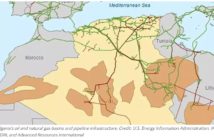THE ASSOCIATED PRESS
Algeria wins over long hostile Berbers to root out al-Qaida in last mountain refuge
By AOMAR OUALI and PAUL SCHEMM
Associated Press
ALGIERS, Algeria (AP) – Weary from years of kidnappings, the inhabitants of Algeria’s rugged Kabylie mountains are finally turning against the al-Qaida fighters in their midst and helping security forces hunt them down. And that turnaround is giving Algeria its best chance yet to drive the terror network from its last Algerian stronghold.
While defeated in much of the rest of the country, al-Qaida in the Islamic Maghreb remains active in the Kabylie, partly because the Berbers there, the region’s original inhabitants before the arrival of the Arabs, have long been deeply hostile to the central government and refused to provide information on militant whereabouts or activity.
The situation began changing after a string of militant attacks over the summer, culminating in a brazen daylight assault against the police station, prompted Algeria to hold an emergency security meeting to devise a new strategy to take on the militants, said a high-ranking official privy to the meeting. A pillar of the counter-terror blueprint: exploiting frustrations over kidnappings to win the Berbers over to the government side, said the official, who spoke on condition of anonymity because he was not authorized to speak to the press.
The strategy appears to have worked in spectacular fashion.
It first bore fruit with the capture early last month of a military commander. Then came the biggest coup: the Oct. 14 slaying of Bekkai Boualem, also known as Khaled El Mig, the head of external relations for AQIM. In the next two weeks, four other suspected militants were ambushed and killed by security forces following tipoffs from the local population.
The successes have some Algerians hoping that the country may finally quash a decades-old Islamist insurgency.
While world powers prepare for a possible military intervention against al-Qaida and its Tuareg allies far to the south in Mali, the militant group’s leaders in northern Algeria are confined to rugged mountains that are turning into their prison.
In July, The Associated Press reported how the once feared AQIM, which grew out of an Islamist uprising in the 1990s, has recently been unable to do much more than launch pinprick operations against military checkpoints around its mountain fastness – a far cry from when it terrorized citizens of the capital with car bombs and laid villages to waste.
Now, renewed efforts by security in cooperation with locals may even drive them out of this final mountain hideout.
Local cooperation is key. One of the reasons Al-Qaida was able to find sanctuary in the mountainous Kabylie region was because the Berber population have long been at odds with the government. While they never shared the radical Islamist ideology of al-Qaida, they were deeply suspicious of the army and gendarmes, or national police, which they saw as oppressive representatives of a hated central government.
What may have finally tipped the balance for the local population in recent months was the steady campaign of kidnappings in the region against prominent businessmen, believed carried out by the militants to fund their operations. Local officials say in the past year more than 70 businessmen were targeted – resulting in businesses fleeing the region. Experts estimate that AQIM across the region has earned tens of millions of dollars in recent years from ransoms.
“The kidnappings were interpreted by the people of the Kabylie as an effort by the terrorists to bring the local economy, already suffering from unemployment, to its knees,” said the security official.
Mahmoud Bellabes, the president of the regional council for the Kabylie, said that while most inhabitants still view the army and gendarmes with suspicion, there is a growing trust for police, who tend to be drawn from the local population.
“In recent weeks, the terrorists were caught thanks to information given by the citizens to police when they saw unknown people in the area, so there has been small coordination between the police and locals,” he said.
Majid Hamiche of the local civilian defense forces confirmed that the latest successes against the militants were due to tipoffs from citizens, though he maintained that people are still reluctant to talk to security forces, after a long legacy of repression by a central government opposed to calls for Berber cultural and political autonomy.
“When you turn someone in, they then ask you lots of questions,” he said.
Militants took up arms against the Algerian government after the generals in 1992 canceled a parliamentary election that an Islamist party was poised to win. In the ensuing fighting, an estimated 200,000 died.
Thanks to a combination of ruthless repression as well as amnesty offers, the army gradually pushed the militants, who declared allegiance to al-Qaida in 2006, into the mountains of the Kabylie region – where Algeria’s revolutionaries once fought for independence against their French colonial masters in a bitter 1954-62 struggle.
A branch of the group headed south, however, and in the lawless desert regions on the borders of Algeria, Mali, Mauritania and Niger managed to reconstitute itself as a body taking part in smuggling routes and kidnapping foreigners. Far from the Algerian army, they have found success, while the founders of the group languish in their mountain hideout in northern Algeria.
Riccardo Fabiani, the North Africa analyst for the London-based Eurasia Group, cautioned against pronouncing the end of Al-Qaida in the Kabylie region too quickly, since the government keeps a tight lid on all information regarding the battle against the militants.
“There are no reliable statistics on terrorists in Algeria: no one knows anything about how many new recruits there are every year, how many people abandon terrorism within the framework of the national reconciliation program, how many people are actually killed,” he cautioned.
Echoing the opinion of many people in the Kabylie, Fabiani also noted that to some extent it serves the government’s interests to have a constant low-level threat in an area remote from the capital to remind people of the darker days of the civil war.
“Terrorism plays an important role in the Algerian political system,” he noted. “This is not to say that the government manipulates terrorism – we don’t know that – but for sure a certain level of fear is instrumental to the current political equilibrium.”
And violence isn’t eradicated yet. On Oct. 18, a group of armed men stopped a bus at a fake checkpoint in the Boumerdes region and checked each passenger’s identity papers until they found two members of the military, whom they dragged out of the bus and shot dead by the side of the road before disappearing back into the bush.
Schemm reported from Rabat, Morocco.
.






